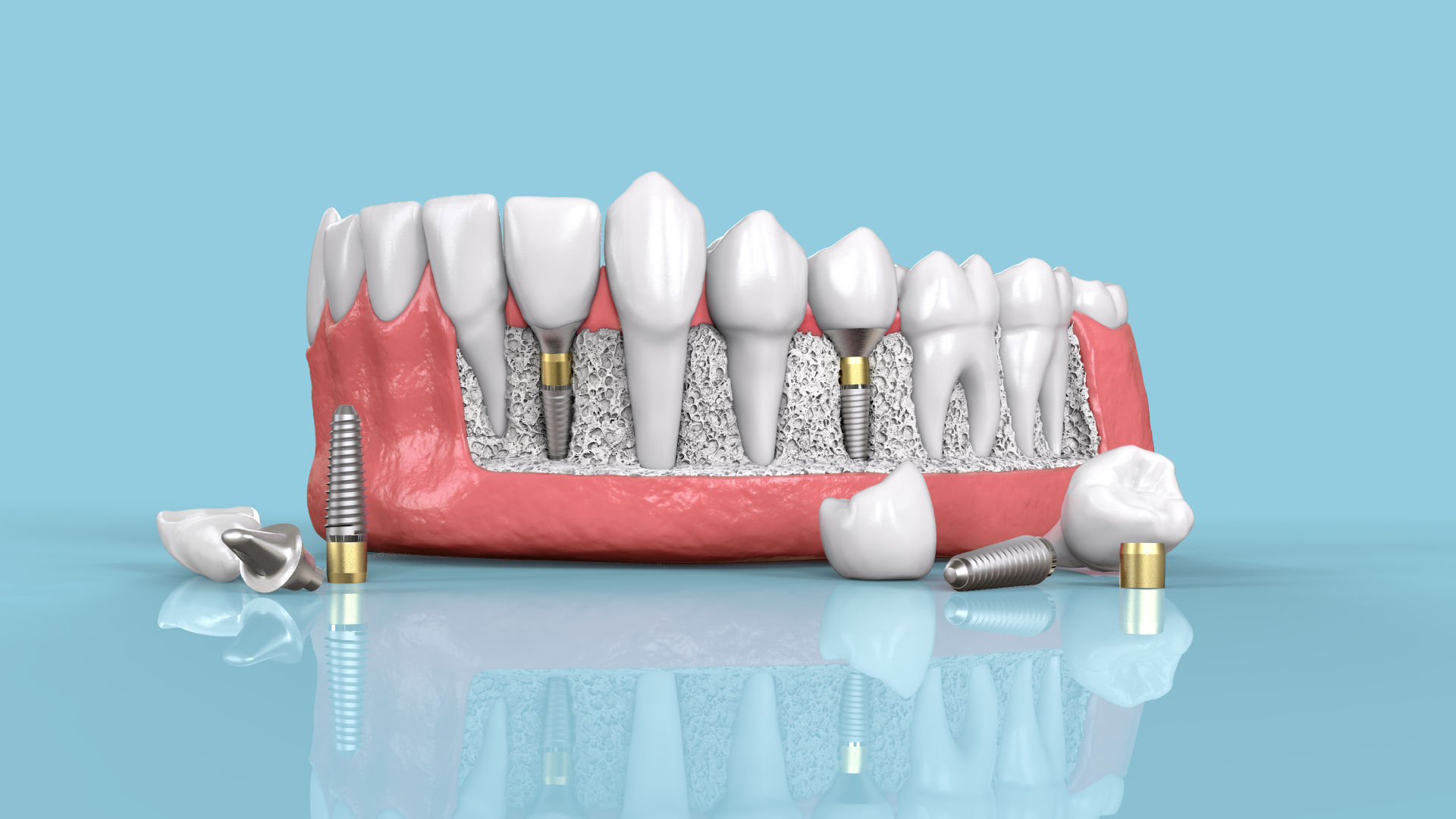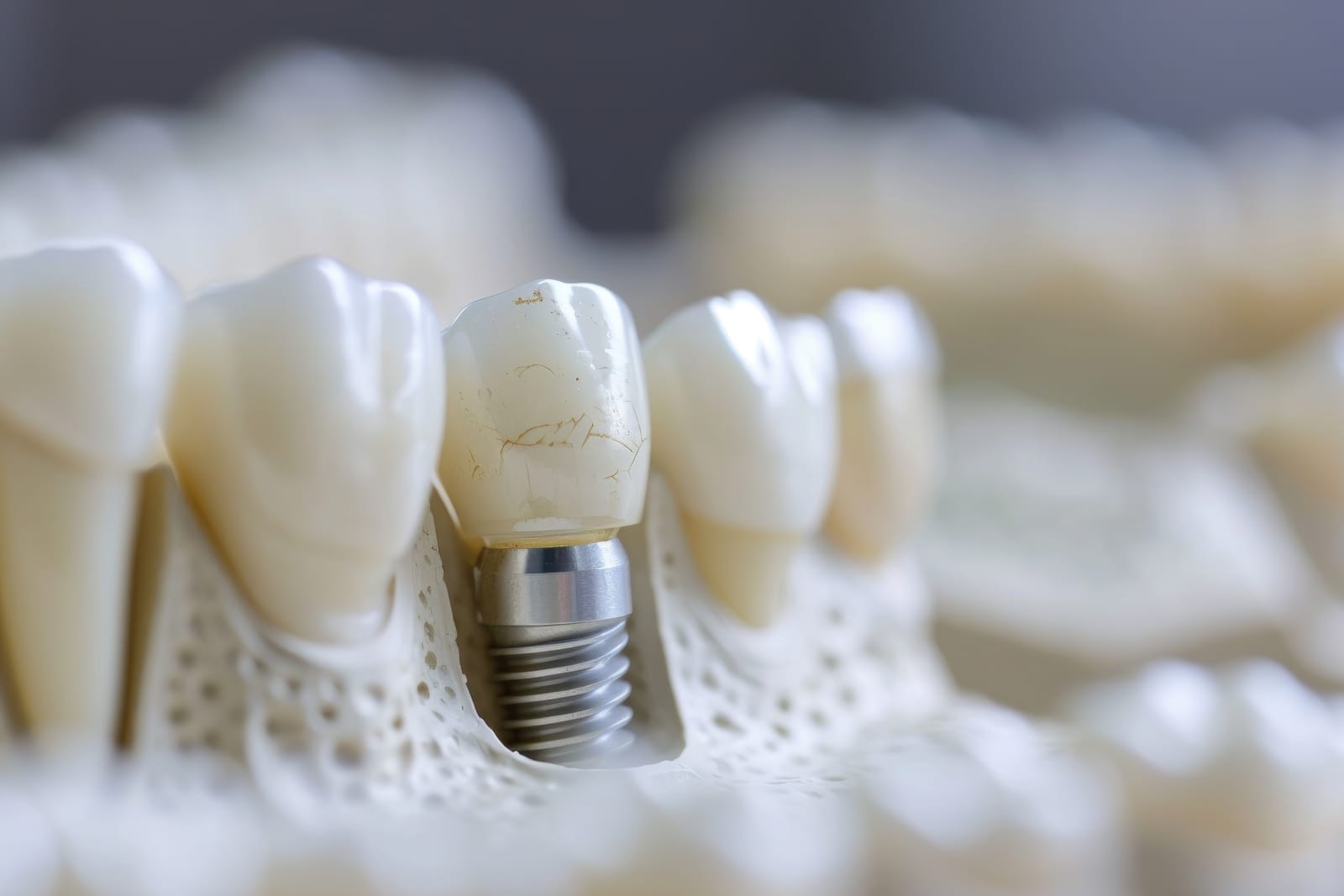18th October 2024
The Complete Guide to Dental Implants: What to Expect Before, During, and After the Procedure
Planning to get dental implants in York and want to know more about what to expect? This is a complete guide to dental implants.
If you are thinking about getting dental implants but feeling unsure about the whole process, you’re not alone!
Many people want a reliable, long-lasting solution for missing teeth but need a bit more information before making the decision. So, in this complete guide to dental implants, we’ll walk you through everything you need to know about the treatment.
By the end, you’ll have a clear idea of what the treatment involves. That way, you can feel confident taking the next step toward restoring your smile!
What Are Dental Implants?
Let’s start off by letting you know what dental implants are in the first place.
Implants have long been the perfect solution for missing teeth. They are small metal posts that act like replacement roots for missing teeth.
They’re placed into your jawbone, where they create a strong base for new, natural-looking teeth. Think of them as the foundation for a sturdy, long-lasting smile.
Once the implant is in place, you’ll have a tooth that looks and feels just like your own.

Benefits of Dental Implants
Dental implants come with a range of benefits that go beyond just replacing a missing tooth. They’re not only a long-term solution but also help improve your overall oral health and confidence.
Let’s take a look at some of the key benefits that make dental implants such a popular choice!
Dental implants are designed to look and feel just like your real teeth. Once they’re in, no one will be able to tell the difference, and you’ll forget they’re not natural!
Unlike other options, dental implants are a permanent solution. With proper care, they can last a lifetime, making them a great investment for your smile.
-
Improved chewing and speaking
Missing teeth can make chewing and speaking tricky. Implants restore full function, so you can enjoy your favourite foods and speak confidently without any discomfort.
When you lose a tooth, the bone in your jaw can start to shrink. Dental implants help prevent bone loss by stimulating the jawbone, keeping it strong and healthy.
Let’s face it – a missing tooth can make you feel self-conscious. With dental implants, you’ll regain your smile and your confidence, knowing you look great.
Caring for dental implants is as simple as caring for your natural teeth. Just brush, floss, and visit your dentist regularly to keep them in top shape.
Unlike bridges, which rely on neighbouring teeth for support, implants don’t affect your surrounding teeth. This means they stay strong and healthy while your new tooth stays secure.

Who is a Candidate for Dental Implants?
Tooth implants are a great option for most people who have lost their teeth but are in good general health. If you have enough bone in your jaw to support the implant and healthy gums, you’re likely a good candidate.
Even if you’ve lost some bone, there are procedures like bone grafts that can help prepare your jaw for implants.
However, if you have certain conditions – such as uncontrolled diabetes, gum disease, or you’re a heavy smoker – it could affect the healing process.
During your consultation, we will assess your situation and help determine if implants are the right option for you.
There are different types of implants
When it comes to dental implants, there isn’t a one-size-fits-all solution.
Depending on your individual needs and the condition of your jawbone, there are different types of implants to choose from.
Let’s break down the main types and what you should know about each one.
#1: Endosteal implants
This type of dental implant is the most common type. These are small titanium posts that are surgically placed into your jawbone, acting like artificial tooth roots.
Once they fuse with the bone, a crown is placed on top, creating a stable, permanent tooth replacement. They’re a great choice if you have enough healthy bone to support them.
#2: Subperiosteal implants
Subperiosteal implants sit on top of the jawbone, rather than being implanted directly into it.
These are used for patients who don’t have enough healthy jawbone and aren’t good candidates for bone grafting.
Instead of posts going into the bone, a metal frame is placed under the gum, and the new teeth are attached to this frame.
#3: All-on-4 implants
All-on-4 implants are ideal if you need to replace a full arch of teeth.
Instead of placing an implant for every tooth, four strategically placed implants support a whole set of upper or lower teeth.
It’s a great option for those looking for a faster, more efficient solution for replacing multiple teeth.
#4: Mini implants
Mini implants are smaller than traditional implants and are often used in areas where space is limited or the bone is too thin for a full-sized implant.
They’re less invasive and can be a good option for securing dentures or replacing small teeth, but they may not be as durable as full-sized implants.
Each type of implant has its own benefits, and we will help you choose the best one based on your specific needs and jaw structure.

The Dental Implants Procedure – What to Expect with Dental Implants
The dental implant process is typically done over a few steps, but don’t worry – it’s all pretty straightforward.
It starts with a consultation, where one of our specialists will assess your mouth, take X-rays, and discuss whether implants are the right solution for you.
If you’re a good candidate, the first part of the procedure involves placing the implant itself. This is a small titanium post that acts like an artificial root, and it’s surgically placed into your jawbone.
The area will be numbed, so you won’t feel any pain during the procedure.
After the implant is placed, there’s a healing period called osseointegration, where the implant fuses with your jawbone. This can take a few months, but it’s important for creating a strong foundation for your new tooth.
Once your implant has healed and bonded with the bone, we will attach a small connector piece called an abutment.
Finally, a custom-made crown is placed on top of the abutment, giving you a fully functional, natural-looking tooth.
Throughout the process, we will ensure everything is healing properly, so you can feel confident in the result.
How to Take Care of Your Dental Implants
Taking care of your dental implants is easier than you might think! Just treat them like your natural teeth, and you’ll be in great shape.
Make sure to brush twice a day and floss daily to keep your implants and gums healthy.
It’s also important to visit your dentist regularly for check-ups and cleanings. This way, we can make sure everything is in tip-top condition and catch any potential issues early.
Avoid biting on hard objects like ice or pens, as this can damage the implant or crown.
If you grind your teeth at night, consider getting a mouthguard to protect your implants.
By keeping up with good oral hygiene and making smart choices, your implants can last a lifetime!
Getting a Dental Implant Specialist in York
Ready to take the next step in your journey toward a healthier, more confident smile?
At The York Dental Suite, we specialise in providing top-quality dental implants tailored to your needs. If you’ve been considering implants and want expert guidance, our team is here to help every step of the way.
Whether you’re still exploring options or ready to start the process, our guide to dental implants will give you all the information you need.
Schedule a consultation with us today and let’s get started on restoring your smile!

Knowing More About Dental Implants – Frequently Asked Questions
Can a dental implant fall off?
While it’s extremely rare, a tooth implant can loosen or fall out if it doesn’t properly fuse with the jawbone or if there’s an issue with bone support.
Regular dental visits and good oral hygiene help ensure the implant stays secure.
Are dental implants safe?
We understand your concern – safety above all things! Interestingly, dental implants are a safe and well-established procedure with a high success rate.
When placed by an experienced professional, they are a reliable solution for replacing lost teeth. At The York Dental Suite, we use the latest techniques to ensure your safety and comfort.
What downsides can I expect?
The main downsides of dental implants are the time commitment and the cost. The process can take several months due to the healing period, and implants tend to be more expensive than other tooth replacement options. However, the long-lasting results often make them worth it.
Why are dental implants so expensive?
Dental implants are more expensive because they involve surgery, high-quality materials like titanium, and a lengthy process that requires precision and expertise.
However, the long-term benefits, including durability and functionality, make them a worthwhile investment.
Do dental implants feel the same as natural teeth?
Yes, implants feel very similar to natural teeth. Once the implant is placed and the crown is attached, you won’t even notice it’s there.
It functions just like a real tooth, allowing you to chew, talk, and smile confidently.
How long do dental implants last?
With proper care, dental implants can last a lifetime. The implant itself is permanent, but the crown may need to be replaced after 10-15 years due to normal wear and tear.
How long does it take to recover from a tooth implant?
Most people can return to their normal routine within a day or two after the procedure, but the full healing process takes a few months.
This is because the implant needs time to fuse with the jawbone before the final crown can be placed.
What are the signs of dental implant failure?
Signs that you probably have had a failed implant include severe pain, swelling, gum recession around the implant, or the implant becoming loose. If you notice any of these symptoms, contact your dentist right away.
Can dental implants get infected?
Though uncommon, dental implants can unfortunately get infected. An infection can occur if bacteria enter the area during or after the procedure. Maintaining good oral hygiene and attending follow-up visits can help prevent infections.
Final Note
Dental implants are one of the most effective teeth replacement solutions, providing a long-lasting, natural-looking result that can significantly improve both your smile and your confidence.
If you’re considering the dental implants procedure but still have questions or want more details on what to expect with dental implants, don’t hesitate to reach out.
At The York Dental Suite, we’re here to guide you every step of the way.
Contact us today to schedule your consultation and take the first step toward restoring your smile!